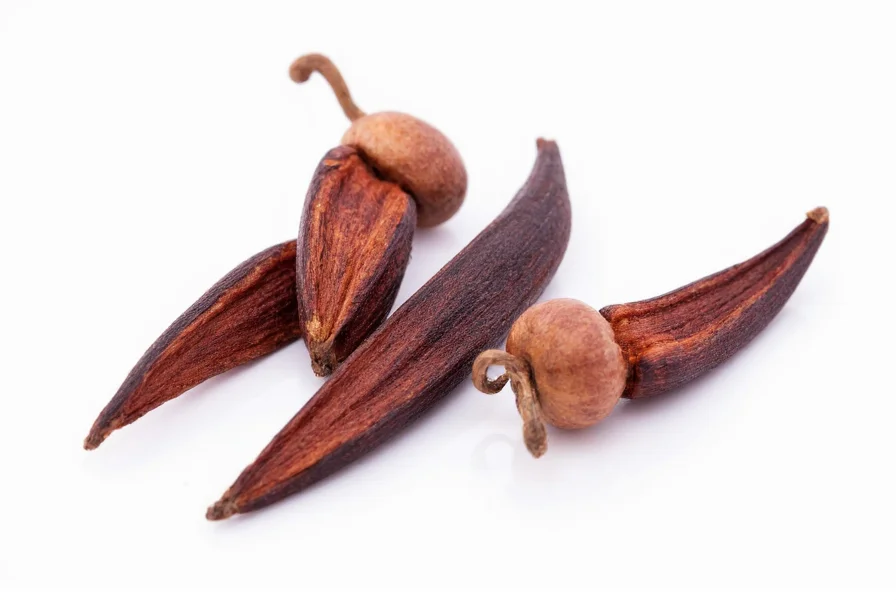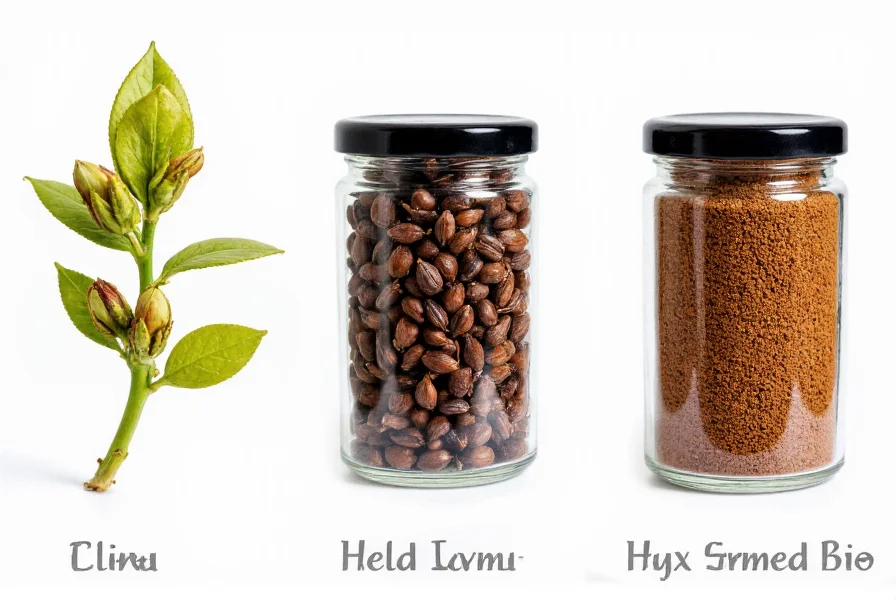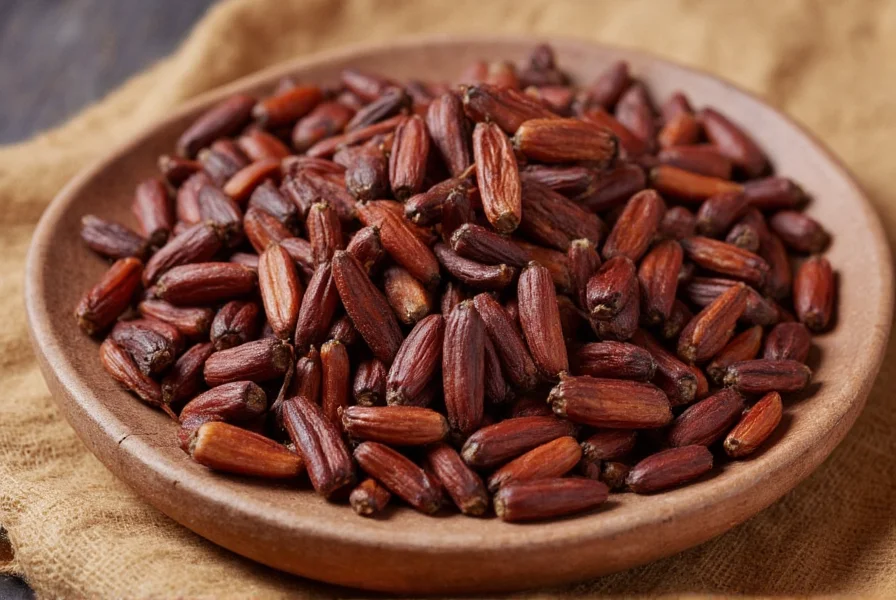Cloves represent one of the oldest and most valuable spices in global trade history. These small but potent buds have been used for thousands of years across various cultures for culinary, medicinal, and preservation purposes. Understanding what cloves are requires examining both their botanical characteristics and practical applications.
Botanical Classification and Origin
The clove tree (Syzygium aromaticum, formerly known as Eugenia caryophyllata) belongs to the Myrtaceae family. This evergreen tree can reach heights of 8-12 meters when mature and produces the characteristic flower buds that become cloves when harvested and dried.
| Botanical Feature | Description |
|---|---|
| Scientific Name | Syzygium aromaticum |
| Native Region | Maluku Islands (Moluccas), Indonesia |
| Harvest Timing | When buds turn from green to pink (before flowering) |
| Drying Process | Sun-dried until brown, reducing moisture from 60% to 10-13% |
Physical Characteristics of Cloves
Cloves measure approximately 1-2 cm in length and feature a slender stem with a bulbous, four-pointed head. The distinctive appearance resembles tiny nails, which explains their name derived from the Latin clavus meaning "nail." When fresh, they appear pink, turning deep brown during the drying process.
The essential oil composition gives cloves their intense aroma and flavor profile. Eugenol provides the characteristic spicy warmth, while minor compounds like caryophyllene and humulene contribute to their complex scent. Whole cloves maintain their potency for up to two years when stored properly, significantly longer than ground cloves which lose flavor within six months.

Historical Significance and Global Spread
Cloves originated exclusively in the Maluku Islands for centuries, making them incredibly valuable during ancient spice trade routes. Arab traders controlled the clove trade from the 2nd century CE, carefully protecting their source. European explorers later sought these "spice islands," with the Portuguese, Dutch, and British all vying for control.
The Dutch East India Company went to extreme measures to maintain monopoly, including destroying clove trees on all but a few islands. This historical scarcity explains why cloves were once worth more than gold by weight. Today, Indonesia still produces about 80% of the world's cloves, with significant cultivation also occurring in Madagascar, Zanzibar, and Sri Lanka.
Culinary Applications of Cloves
Chefs and home cooks value cloves for their ability to add depth to both sweet and savory dishes. Understanding how are cloves used in cooking reveals their versatility across global cuisines:
- In Indian cuisine, cloves feature prominently in garam masala and biryani dishes
- Moroccan tagines often include whole cloves for subtle warmth
- Western baking uses ground cloves in pumpkin pie, gingerbread, and holiday recipes
- Many pickling recipes incorporate cloves for their preservative qualities
- Clove-studded onions add flavor to stocks and braises
When using cloves in cooking, remember they have an intense flavor that can easily dominate a dish. Most recipes call for just one or two whole cloves per serving, removed before consumption. For ground cloves, use sparingly—1/4 teaspoon can flavor an entire cake.
Medicinal Properties and Traditional Uses
The health benefits of cloves have been recognized for millennia across various traditional medicine systems. Modern research supports many traditional claims about clove's therapeutic properties, primarily due to its high eugenol content.
Dental applications represent one of the most well-documented uses of cloves. Eugenol's analgesic and antiseptic properties make clove oil an effective temporary remedy for toothaches. Many over-the-counter dental products contain clove derivatives for this reason.
Additional research-supported benefits include:
- Antioxidant properties that combat oxidative stress
- Anti-inflammatory effects that may help with arthritis
- Antimicrobial activity against various pathogens
- Potential blood sugar regulation benefits
Common Misconceptions: Clove vs. Garlic Clove
One frequent point of confusion involves the difference between garlic clove and spice clove. Despite sharing the word "clove," these are entirely different botanical entities:
- Spice clove: Flower bud of Syzygium aromaticum tree
- Garlic clove: Individual segment of Allium sativum bulb
This linguistic coincidence stems from both items having a similar tapered shape resembling an old-fashioned nail or "clove" (from Middle English). When searching for information about what is a clove spice, it's important to distinguish between these two completely different food items.
Selecting and Storing Cloves
For optimal flavor and potency, proper selection and storage of cloves matters significantly. When purchasing whole cloves, look for:
- Deep reddish-brown color (avoid pale or yellowish cloves)
- Intact, unbroken buds with visible oil glands
- Strong aroma when crushed slightly
- Heavy weight for their size (indicates oil content)
Store cloves in airtight containers away from light and heat. Whole cloves maintain quality for 1-2 years, while ground cloves lose potency within 6 months. For extended storage, keep them in the freezer where they'll retain flavor for up to 3 years.

Where Do Cloves Come From Today
While cloves originated in Indonesia's Maluku Islands, commercial cultivation has expanded significantly. Understanding where do cloves come from in modern times reveals a global industry:
- Indonesia: 80% of world production, primarily on Ambon and Seram islands
- Madagascar: Second largest producer, known for high-quality cloves
- Tanzania: Major producer in Zanzibar and Pemba islands
- India: Significant cultivation in Kerala and Tamil Nadu
- Sri Lanka: Smaller but notable production
The clove tree requires specific tropical conditions to thrive—high humidity, consistent temperatures between 20-30°C (68-86°F), and well-drained volcanic soil. These requirements limit commercial cultivation to equatorial regions, explaining the concentrated production areas.
What is the difference between a clove and a garlic clove?
Despite sharing the word 'clove,' these are completely different items. Spice cloves are dried flower buds from the Syzygium aromaticum tree, while garlic cloves are individual segments of the Allium sativum bulb. The shared name comes from their similar tapered shape resembling an old-fashioned nail.
Are cloves good for toothaches?
Yes, cloves have been traditionally used for dental pain relief. The eugenol in cloves acts as a natural analgesic and antiseptic. Applying clove oil to a cotton ball and placing it near the affected tooth can provide temporary relief, though it's not a substitute for professional dental care.
How should I store cloves to maintain freshness?
Store whole cloves in an airtight container away from light and heat. Properly stored, they maintain quality for 1-2 years. Ground cloves lose potency faster and should be used within 6 months. For longest storage, keep cloves in the freezer where they'll retain flavor for up to 3 years.
What gives cloves their distinctive flavor?
The distinctive warm, pungent flavor of cloves comes primarily from eugenol, which makes up 70-90% of the essential oil in cloves. Additional compounds like caryophyllene and humulene contribute to their complex aroma. Cloves contain 15-20% essential oil by weight, giving them their intense flavor profile even in small quantities.











 浙公网安备
33010002000092号
浙公网安备
33010002000092号 浙B2-20120091-4
浙B2-20120091-4